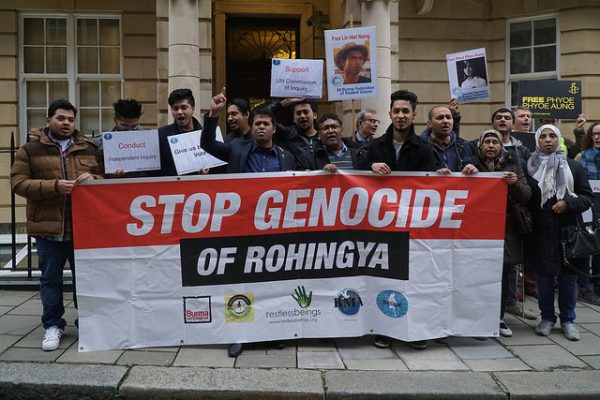
People invent words and definitions to help navigate the world around them. Once created, such labels can have monumental impacts. The word “genocide” is one example of a term that holds meaning for victims, perpetrators, and those who watch violence unfold. Over the past few years, debates have raged as to whether or not to call the Burmese state’s violence against the Rohingya “genocide.” Such debates often privilege the label, rather than focusing on the everyday violence experienced by civilians. Sociologists seek to understand the meaning, use, and consequences of labels like genocide.
Individuals and groups use institutions to construct consensus about labels. But people use terms in different ways, and labels often change in meaning over time. The term “genocide” was first coined by a lawyer, Raphael Lemkin, in the aftermath of the Holocaust. The United Nations adopted this term and formalized genocide as a crime in 1951, but the meaning of genocide continues to be contested. Some academics, for example, advocate for the inclusion of political groups as targets for genocide in addition to collectivities that are already included, like ethnic or religious groups.
- Howard Becker. 1963. Outsiders: Studies in the Sociology of Deviance. London: Free Press of Glencoe.
- Dirk Moses. 2010. “Raphael Lemkin, Culture, and the Concept of Genocide.” Pp. 19-41 in The Oxford Handbook of Genocide Studies. Oxford: Oxford University Press.
- Philip Spencer. 2012. Genocide Since 1945. London: Routledge
Debates about labels have real effects. In the case of genocide, such implications are most directly felt by populations affected by violence. Victims can feel that their loss is recognized and mourned when appropriate labels are used, while an insufficient label may promote impunity for past crimes. As some theorists argue that an acknowledgement of past wrongdoing is central to healing, the use of fitting labels takes on an even more practical importance.
- Jeffrey Alexander, Ron Eyerman, Bernhard Giesen, Neil J. Smelser, and Piotr Sztompka. 2004. Cultural Trauma and Collective Identity. Berkeley: University of California Press
- Hannah Arendt. 1958. The Human Condition. Chicago: The University of Chicago Press.
Despite these important considerations, some scholars and activists express concern that focusing on labels does more harm than good. The label of “genocide,” though critically important to survivors and advocates, does not come with legal obligations to intervene. While policymakers and activists discuss the relevance of the term “genocide” in Burma, atrocity crimes continue to unfold. As such, some scholars argue that the social importance of labels can distract from the immediate needs of victims of violence. From this vantage point, scholarly and advocacy attention is best directed towards serving the needs of those impacted by violence.
- Dirk Moses. 2012. “The Canadian Museum for Human Rights: The ‘Uniqueness of the Holocaust’ and the Question of Genocide.” Journal of Genocide Research 14(2): 215-238.
- Mahmood Mamdani. 2007. “The Politics of Naming: Genocide, Civil War, Insurgency.” London Review of Books 29(5): 5-8.

Comments